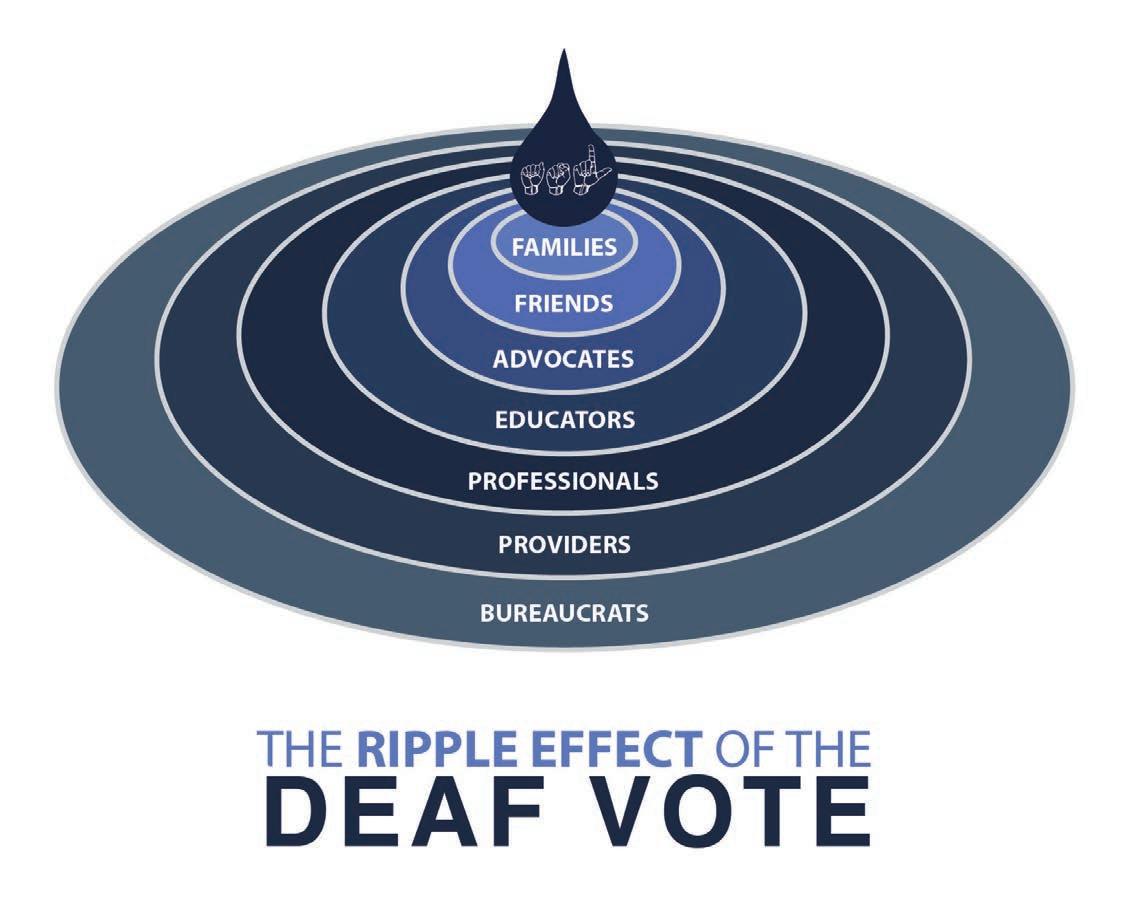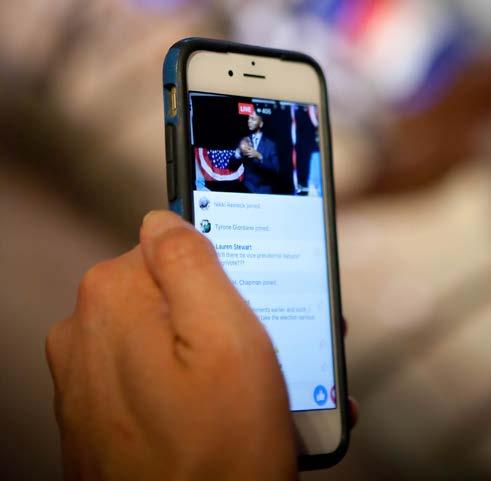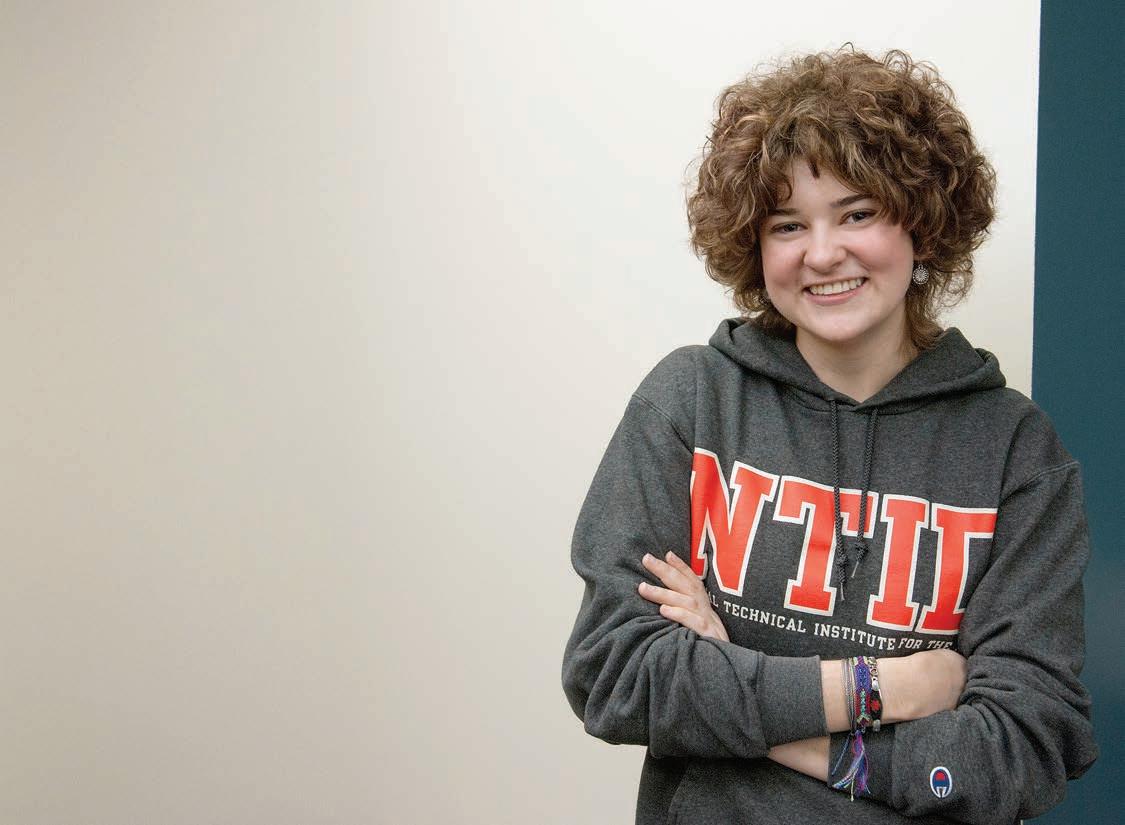
6 minute read
Collective Deaf Voting Power: Organizing and Educating in ASL
They also push for more people to register and pledge to vote.
SignVote coalition partners include several wellknown deaf organizations and institutions. The National Association of the Deaf, DPAN.TV, Council de Manos, the National Technical Institute for the Deaf, Gallaudet University, are just a few. They help educate and engage the deaf community around the 2020 election. SignVote aims to raise awareness of the lack of access to politics. SignVote will also collect 2020 accessible election content in ASL. However, it cannot become a deaf movement without us working together. Collectively, we create a more representative electorate. We can also encourage debate on a range of public policy issues. We will promote civic engagement with greater access and education. This is necessary to build power within our varied deaf communities.
Advertisement
If you are a community member seeking information on how to vote, clarification on political terminology, a candidate’s platform, or to connect with other civic-minded deaf individuals, consider subscribing to SignVote. At SignVote.org, you will find our resource center, which includes several great tools:
Deaf voters can easily access a wide variety of helpful tools and videos using the online resource center at SignVote.org.

• A direct link to NAD’s ASL Voter Hotline. You can ask any burning questions about the election or voting. Just call in to get connected with a volunteer;
• A voter toolkit with informative videos and
links. Better understand your political views and how to vote; • A video playlist. Watch content from the community and political news in ASL. Send us your videos to be added to the collection;
• Rock the Vote’s information about state-by-state
voting policies; and
• Information from the Deaf and Hard of
Hearing Consumer Advocacy Network
(DHHCAN). DHHCAN is a group of organizations invested in the accessibility needs of the deaf and hard of hearing community, and their seven DHH-related policy proposals.
So, what next? Get ready to #rockthevote by taking advantage of these resources. Start having meaningful discussions with your family and friends. Register to vote. Join the SignVote movement to stay “in-the-know” and help shape what we hope will become the Deaf Agenda Plan that politicians cannot ignore. Together, we can hold them accountable to our community.
Based in Detroit, Michigan, Kriston Lee Pumphrey, former DTV News anchor, is CSD’s Community Engagement Manager spearheading the 2020 SignVote Campaign, a deaf nonpartisan effort to centralize election content and resources in ASL.
You can contact Kriston Lee at signvote@csd.org or kpumphrey@csd.org.
Sprint Relay Store
Sprint Relay Data Only Plan you can get: n No annual service contract* n Unlimited data (Internet & email)** n Unlimited messaging (SMS)** Plus available Accessibility Care online chat
* Requires lease, paid in full or bring your own device ** Other monthly charges apply. Unlimited features while on the Sprint Network
Need the Sprint Relay Data Only Plan on your existing Sprint account, contact srs@sprint.com.

sprintrelaystore.com

**Monthly charges exclude taxes & Sprint Surcharges [incl. USF charge of up to 21.2% (varies quarterly), up to $2.50 Admin. & 99¢ Reg. /line/mo. & fees by area (approx. 5–20%)]. Surcharges are not taxes. See sprint.com/taxesandfees. Activ. Fee: Up to $30/line. Credit approval req. Featured devices may also be activated on voice plans. Although Sprint IP, Fed IP & CapTel can be used for emergency calling, such emergency calling may not function the same as traditional 911/E911 svc. By using Sprint IP, Fed IP & CapTel for emergency calling you agree that Sprint is not responsible for any damages resulting from errors, defects, malfunctions, interruptions or failures in accessing or attempting to access emergency svc. through Sprint IP, Fed IP & Captel whether caused by negligence of Sprint or otherwise. Incoming call block: Incoming calls are blocked. Outgoing calls will be billed at 20¢/min. (local voice calls) or 40¢/min. (long distance voice calls). Messaging: Includes sent/received domestic text, picture and video. Int’l. msgs. 20¢/msg. (in U.S.); 50¢/msg. (outside U.S.). SMS voice messages may incur an add’l. data charge of 3¢/KB. Data: Add’l. charges apply for premium content/downloads. Sprint TV includes select channels/content and are subject to change. GPS reliability varies by environment. Int’l. svcs. are not included. Includes select e-mail. Usage Limitations: Sprint may terminate svc. if off-network roaming usage in a month exceeds: (1) 800 min. or a majority of min.; or (2) 300MB or a majority of KB. Prohibited network use rules apply. See sprint.com/termsandconditions. Other Terms: Offers/coverage not avail. everywhere or for all phones/networks. Restrictions apply. See www.sprintrelaystore.com for details. © 2020 Sprint. All rights reserved. Other marks are the property of their respective owners.

THE RIGHT FIT

Deaf and hard-of-hearing students bring a variety of life experiences and communication preferences to RIT, but all have one thing in common – RIT is the right fi t for them.
Find YOUR FIT
NTIDadmissions@rit.edu www.rit.edu/ntid/fi t
585-475-6700 (voice) 585-743-1300 (videophone) 866-644-6843 (toll free U.S. & Canada)
#JrNAD2019 Motions

BY CHANEL GLEICHER BONHEYO
The Jr. NAD had its biennial general assembly at the recent Jr. NAD National Conference, held November 6-10, 2019, hosted by the Rochester School for the Deaf. President Emma Kane, of the Rochester School for the Deaf, led the assembly with 27 chapters in attendance. There was a total of 42 Advisors, 50 Delegates and 30 Observers. The Delegates were responsible to vote during the meeting, while the Observers were there to observe and support their Delegates. The Jr. NAD Delegates had the opportunity to make motions and vote for what they would like to see for Jr. NAD for the next two years.
During the Jr. NAD general assembly, there are two recurring motions: 1) vote for two Jr. NAD Delegates to attend to the NAD Conference; and 2) vote for the next Jr. NAD Conference site. Then, the Jr. NAD uses its remaining meeting time to make motions and vote on important motions for the two Jr. NAD Delegates to bring to the next NAD Conference.
Here are the motions that were passed at #JrNAD2019:
The Jr. NAD Delegates voted for the top five motions to share at the 2020 NAD Conference and by the consensus of the Jr. NAD Assembly, the top six motions (with two being tied) passed:
1. All schools that have mainstreamed deaf students must offer ASL classes and Deaf Culture classes to be taken by all of its students.
2. During all IEPs involving deaf students that are not currently in a school for the deaf, the option to place the student in a school for the deaf should be explained to the parents/family members and the deaf student.

3. Doctors that notify parents that their child is deaf should be required to inform the parents about deaf schools and all other options, and to ensure that the deaf child has an opportunity to decide whether to accept cochlear implants.
4. All public places that have televisions for public viewing must ensure that captions are turned on at all times.
5. When ticketing Deaf individuals, law enforcement officers must issue tickets that contain visual icons representing the offense.






